by Mayumi-H | Aug 7, 2013 | Process

Sunset at La Jolla, CA, USA
I just got back from another vacation at the sea, enjoying the sun and surf. As always, great fun to hang with that beach crowd, though, by the end, I was more than ready to leave behind all the “dude”-ing that seems so prevalent on our western coast.
When I spend time watching the waves, I feel a bit sad for people who have never seen or experienced the sea in all its natural glory. Whether that’s enjoying the rush of a curling rip on a longboard or the soporific lap of a gentle tide in a rowboat, it’s one of life’s great adventures, to be in the sea. It makes one feel small yet in touch with the world as a whole. It’s primal, and soothing, and frightening, all in the same moment. It also makes one appreciate the responsibility championed by Aquaman and the Submariner a bit more.
Stepping into rolling surf takes strength, courage, determination. As strong a swimmer as you may think you are, you can easily get wiped out…or, at least, shoved back to shore by an even stronger wave. But I do it, because the sense of joy and freedom to be in those swells is too well-loved for me to consider staying on the beach all my life.
The same can be said for writing, I suppose. It’s easy to stay in the shallows, where we’re safe. It’s fun, too, just wading around, getting our feet wet, without any hint of danger. The sand stays under our toes; it’s just a hop to dry land. It’s calm, cool, refreshing. But, there’s no rush, no excitement. There’s no sense of triumph to be had simply dunking our toes. Anybody can do that.
So, we stride deeper, against the current. We move our arms and legs to stay above the water line. We swim. We dive. We ride. Not for ever. Maybe not even for very long. But we push ourselves, because adventure calls among those tall, crashing tidal breaks.
What’s adventure without action, though?
I’ve spent most of my writing life working in drama, where tension comes from feeling and emotion, not action. It’s a good place for me to be, I think, and I enjoy it. But, every once and again, I feel the urge to step out a bit further, past my safe boundaries.
On the plane flying out to the coast, I wrote about 3000 words of a throwaway story. Just me typing away to impulse, really. But, I wrote a little action scene. Now, I’m not strong with action: too much description, not enough tension. “Confusing,” readers have told me. And, “Boring.” Yikes. That wasn’t something I liked hearing. But, I’m actually rather pleased with this one. It’s short, which I think is good. About one action for every one or two seconds or so, too. And, it’s got a bit or resonance for the characters, which I always like.
I’d like to try my hand at more action, if the story warrants it. I think that’s important, too: action for action’s sake – just as drama for its own sake – does no favors to a story. Letting a story’s voice tell me what it needs and wants is a part of storytelling I need to remember. But, for now, I’ll enjoy these little action scenes.
I’m working through my backlog of blog updates this week. So, I’m asking for your patience a tad longer. It was a bit too wonderful to step away from the Internet for several days!
What’s your favorite sort of scene? Drama? Humor? Romance? Action? Have I forgotten some? What do you do to push yourself out past your regular boundaries?
by Mayumi-H | Jun 12, 2013 | Persona 4 Fan Fiction, Process
This past Monday, I had another photo shoot with my photographer, Celeste Giuliano. It marked the thirteenth photo setup I’ve done with Celeste, since 2007. Of course, it being the thirteenth shoot, we were cursed with a few difficulties (late trains, blown lights, and rain!), but I had an amazing time, as I always do.
I first started these photo shoots as a way to feel better about myself. I’ve never considered myself a Gorgon, but, I’d started to feel plain, unnoticed. Kind of worthless, actually. Especially when I looked around and saw all these beautiful others, who weren’t me.

By Italiamoderna at it.wikipedia [Public domain], from Wikimedia Commons
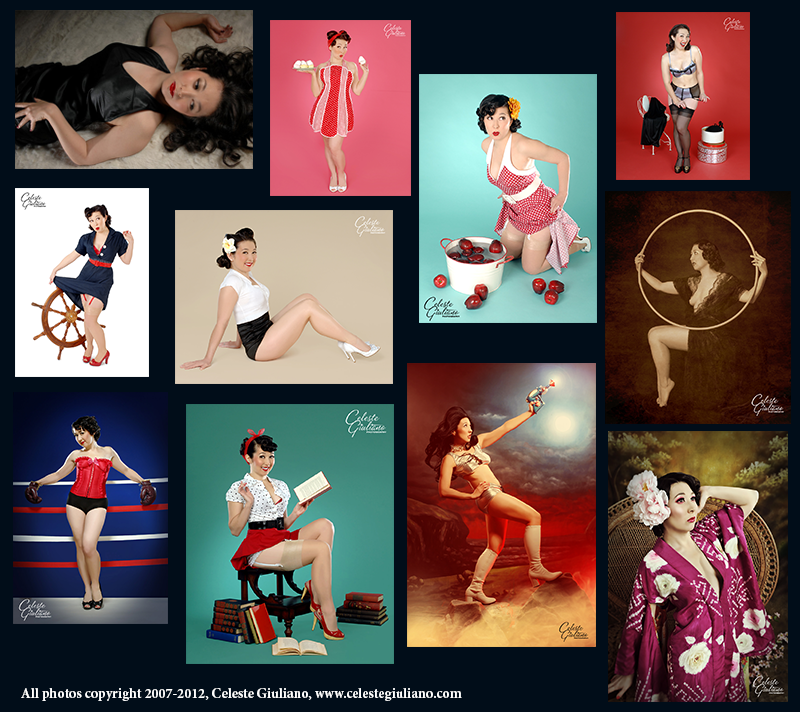 As well as being inspired to do these photo shoots, they also inspire me. For days, even weeks, after a shoot, whenever I look into a mirror, I remember how empowered it feels to be proud of who I am. I don’t see the flaws in myself, but what makes me beautiful. I try to remember those feelings when I look at my work, too.
As well as being inspired to do these photo shoots, they also inspire me. For days, even weeks, after a shoot, whenever I look into a mirror, I remember how empowered it feels to be proud of who I am. I don’t see the flaws in myself, but what makes me beautiful. I try to remember those feelings when I look at my work, too.
When we review scenes, chapters, or whole stories for editing, we often focus on the imperfections. That’s not a criticism of editing and revision; it’s important for us to note where our stories can be stronger, what we can change to make them better. But, sometimes, in seeing all those imperfections, we can lose sight of what’s beautiful.
Never forget the essence of your story. It may not be as handsome, as charming, as strong, or as popular as the one you saw while strolling through the aisles of your book shop. But it’s got its own beauty. Nurture that. If you do, you’ll feel – like I did, after my latest photo shoot – like you’re fifty feet tall.
by Mayumi-H | May 25, 2013 | Process, Short Stories
“A Little Sliver of Nirvana”
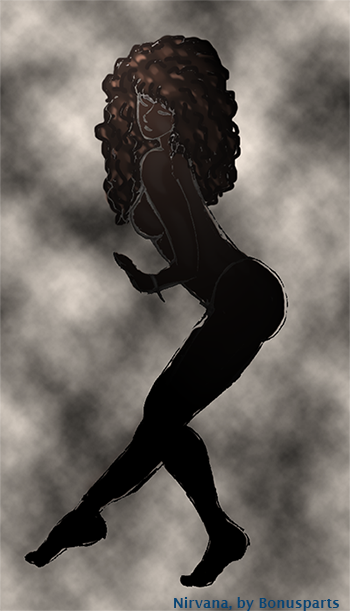
Another 20-minute effort, funkified with Photoshop
Wading through the sea of boozehounds and whores pressing flesh and passing money, an unending rolling tide of vice and greed, he settled in to the corner booth, the one with the well-worn center cushion seat and the uneven grooves in the grain where metal stiletto heels had tread for too many nights. He clicked the control pad beside his seat, prompting the silencing swish of the heavy velvet shroud, and sat back, closing his eyes in the dim dank, to wait.
A flutter of music – high winds with low brass, though more than that he couldn’t tell – made him breathe deep, the scent of soap and lilies filling his nose, erasing the thick stench of sweat and despair. And, looking up, now, he saw her: legs shifting, hips rolling, belly and breasts shining with some invisible light; arms swaying, hair swinging, lips and eyes focused on him, holding him in the trance of her magic-making for as long as they both could stand it, this little sliver of Nirvana.
Slowing at the whisper of the final chords, she frowned, reaching out to him – forbidden, but she’d never cared – to touch his face, when he grabbed her wrist with one hand and slapped the other on the space of table between them, around a treasured bundle of cash, and murmured, “Marry me, now?”
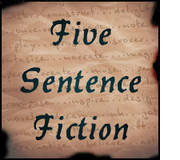 Today’s original fiction piece inspired by this week’s Five Sentence Fiction prompt, “CHARMED,” from Lillie McFerrin.
Today’s original fiction piece inspired by this week’s Five Sentence Fiction prompt, “CHARMED,” from Lillie McFerrin.
I wrote this entry on my morning commute on Friday, so it’s about 20 minutes’ worth of concentration and typing. I didn’t bother with any editing or refining. I’m not making any apologies for it, either. I’ve decided that, if a prompt doesn’t inspire an idea within 5 minutes, I let it pass. If I do get an idea but I can’t make it materialize properly in 30 minutes, I set it aside in my ever-growing “Random” folder. No offense intended to the folks posting these lovely prompts – or those participating more fully than I’m doing – but I want to concentrate on my larger writing goals. For me, this plan is a nice balance.
Do be sure to visit Lillie’s site for more Five Sentence Fiction submissions, though, and for other flash fiction goodness!
How do you balance between all the stories in your head?
by Mayumi-H | May 22, 2013 | Persona 4 Fan Fiction, Process, Short Stories
A few weeks ago, I wrote about a particular Free Write Friday picture prompt (Free Write Fridays from Kellie Elmore). What came from that free write session was about 1600 words of a relationship story, one that flowed so naturally from my fingers, I just couldn’t stop writing it. As I mentioned in that earlier post, what struck me as I wrote those characters was how much of a role their religion played in their dialogue. Their sexuality also featured prominently, which is one of the main reasons why I didn’t post the piece at the time. Because you never know who you might offend.
Generally speaking, offending potential readers is not something I care very much about. It’s my belief an artist should create Art that speaks from the soul, no matter how dark, bright, raunchy, or chaste. Whether the artist can then sell that creation if they so choose is an entirely different debate. But, the Art at its core should be honest. Otherwise, it’s not so much art or even craft, but simply a consumable.
Side note: I’m not saying there’s anything inherently wrong with producing for consumption. Nor am I saying consumables necessarily exclude artistry, or vice versa. I think A Song of Ice and Fire has proven that pretty well. Besides, every one needs to eat, no matter how high-falutin’ their principles.
That said, I recently revisited that piece of free writing because I was curious to look at it with fresh eyes. I wanted to see if it really was as bad as I’d originally thought. Holding a marker, I went over and redacted everything I thought anyone could possibly find offensive in any way. This is what came of that exercise:
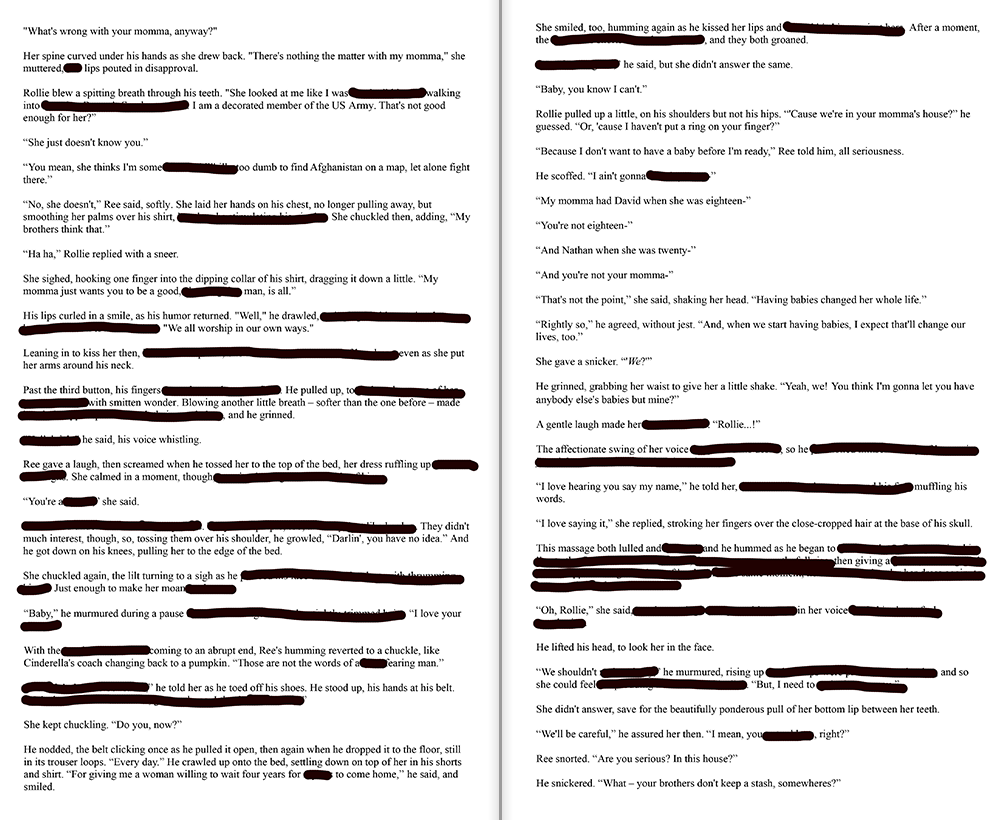
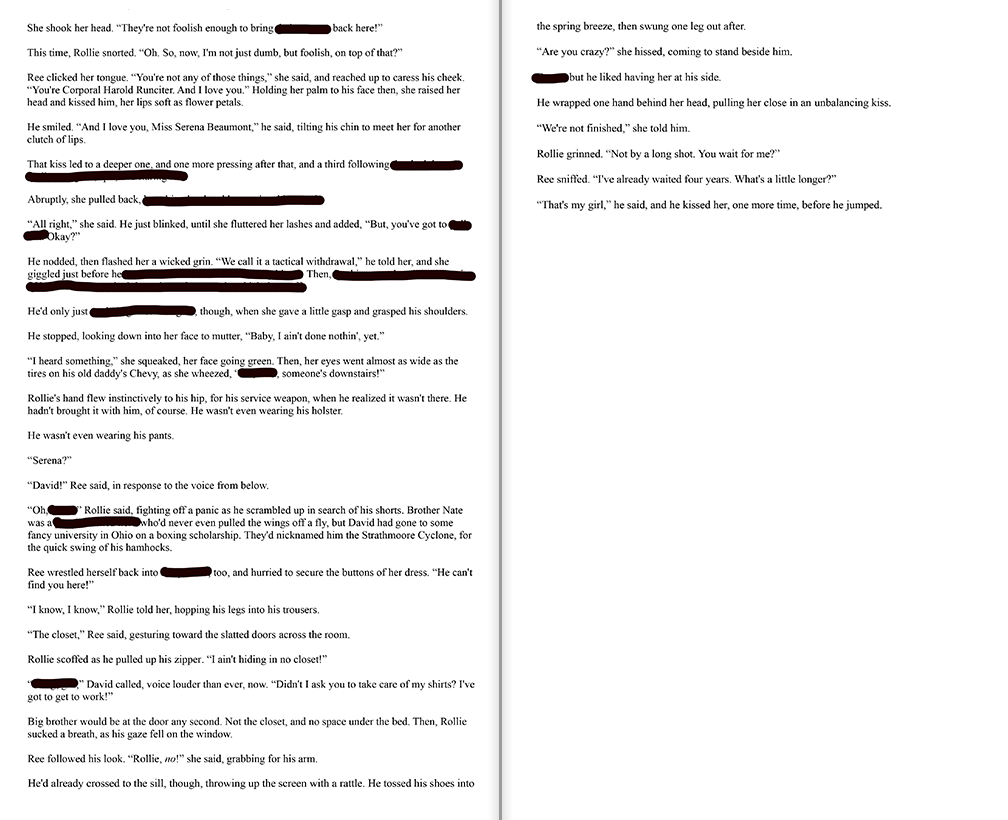
If, for some reason, you’re interested in the actual words, click the images for a more legible experience (they’ll open in a new window or tab). The scene itself isn’t important, though. The reason for this exercise – aside from fueling my own personal amusement – was for me to see just how much black there’d be on those pages.
I’m not particularly smart, so I can’t write good mysteries or thrillers. I’ve only ever held a gun once, and never in a conflict, so I’m not qualified to write a big war epic. But, I understand people, and the everyday conflicts that can arise from personality and heritage clashes. I know love, too, because I experience it in my life every day. And I like sex, because…well, who doesn’t?
I don’t pull many punches when it comes to my stories. I try my best to warn folks ahead of time if a story contains questionable or mature material, but I also believe any individual should be able to decide for themselves if they want to continue or not. But, I’m writing these for me, first, and those topics are the ones I personally enjoy exploring. If they need to be redacted later, to fit someone else’s idea of what’s appropriate or salable, well, that’s life.
Have you ever redacted or edited something you’d written to fit someone else’s sensitivities? Why did you do it? Or, if you didn’t do it, why not?
by Mayumi-H | Apr 17, 2013 | Persona 4 Fan Fiction, Process
Last Friday’s Free Write Friday prompt from Kellie Elmore was the below photo:
What struck me about the photo was not so much the twister itself or the girl in the foreground, but the way people’s lives can often feel like they’re caught in a storm. And, how lonely that girl’s silhouette is. From nowhere – truly, nowhere, as I am, at the moment, working on three very different stories with nothing to do with the prompt – a scene popped into my head, bright as a bolt of lightning: a young man and young woman hiding together, to be together. It was very conversational but still mostly descriptive of their clandestine affair, which is why I chose not to submit it to the prompt.
The odd part about this story snippet was not the flash of inspiring imagery, or the way these characters felt like familiar ones to me, or even the main conflict fashioned by my brain for why the two of them should meet in secret. Rather, it was the smaller conflict of their histories. Specifically, how religion related to their interaction.
If you think violence or sex are hot-button issues, they’re nothing compared to religion. I don’t even feel very comfortable talking about it, here, because… I don’t know. Because I’m scared, I guess.
Not many readers take issue with crime or violence in stories. It’s part of real life, after all. Sex is a slightly touchier subject, probably because it’s associated with prurience or deviance (which is not always the case, but I think I’ve belabored that point already). Faith, though, is unique to each individual person. Nonetheless, it often feels like we’re treated only to religious extremes, in fiction: fanatics like Margaret White (the mom in Stephen King’s Carrie) or the Republic of Gilead in Margaret Atwood’s The Handmaid’s Tale. Given such examples, it’s hardly a wonder that religion often does not play a role in many stories, at least, not a prominent one.
So, why did I take a religious angle for that scene? Mostly, it came from the dialogue. Evidence of their faith sprang, fully formed, from these characters’ mouths. They didn’t preach to me or to each other. They simply were who they were: a mid-western society girl and her working-class, ex-Army boyfriend. Not even their different racial backgrounds featured so prominently in their characterizations as their religious upbringing.
It was weird. Because my own faith is very personal, and I’d never inject those feelings into a story. Not consciously, any way. Sure, religion has had its part. I’ve examined Shinto, but only for the burial rituals and a wedding ceremony; two of my earlier protagonists were Catholic versus Protestant just for a few low-level jabs; I’ve looked at Anglicanism in a broader sense from a social perspective, mostly to counterbalance the dourness of one of my scientific empiricists. But having characters mouth off to each other about church and faith? That was new.

Shrine to World Religions, by Helen (Flickr: Shrine To World Religions) [CC-BY-2.0], via Wikimedia Commons
Have you ever had your characters take you by surprise, about their personal agendas or perspectives?
by Mayumi-H | Apr 10, 2013 | Process
Knowing how to write dialogue is an important tool for a writer. Even more important, though, I’d wager, is being able to write believable dialogue. Countless articles and books have been written on the subject, but the same advice always crops up: Pay attention and listen.

By David Benbennick [GFDL (http://www.gnu.org/copyleft/fdl.html), CC-BY-SA-3.0 or CC-BY-SA-2.0], via Wikimedia Commons
What we hear in daily conversation doesn’t always work for the written word, of course. Slang, for example, can be problematic to explain to someone unfamiliar with its roots, just as dialect speech can be nightmarish for a reader to slog through. (Joseph, I’m looking at you.) Generally speaking, though, even these examples don’t have to be make-or-break issues with dialogue. If your characters are strong enough in their own voices, the little tweaks and twinges shouldn’t matter so much. Quirky speech patterns can even help identify characters to the audience, often a good thing.
But, those are generalities. I’m talking about specifics, here.
The other day, while sitting with some friends, we were talking about the transience and flow of language across generations. The discussion went pretty deep as we argued our opinions and went back and forth with pros and cons to each perspective. Then, from nowhere, one friend piped up, “I’m gonna bring back ‘rad’ to the common lexicon.”
I burst out laughing…and I knew I’d have to use it in a story.
My friends learned a long time ago that almost nothing said in my presence is sacred. Not to say I can’t keep a secret, because I can do that. But, the words themselves become free to my pen, the second they’ve left anyone’s mouth. I don’t make any excuses for myself in this regard. If I hear it with my ears, it instantly becomes reality – and believable – to me. And, that makes for great dialogue.
Some of my favorite conversations in real life I’ve decided to preserve in my stories. Many of them were simply jotted down in 100-word shorts or random snippets tucked into the pages of a notebook, for use – or not – at some later date. But, others have found their way actively woven into the larger tales, adding a sense of deeper realism and stronger truth to the story that may not have been so deep or so strong without them.
Other writers (ones better than me) say to listen to the world and words around you. Pay attention to the details. Keep your eyes and ears open. And, that inspiration can be sitting right in front of you. Or just to the left, spouting pearls of beautiful dialogue between peanuts and sips of beer.
Some among you may consider my technique of stealing borrowing words from such conversations cheating at my art. As for me, I prefer to consider it art imitating life. For real.
How do you create believable dialogue? Have you ever used real conversations in your stories? Were you able to read Joseph’s dialogue from Wuthering Heights without looking at a translation sheet?





 Today’s original fiction piece inspired by this week’s Five Sentence Fiction prompt, “
Today’s original fiction piece inspired by this week’s Five Sentence Fiction prompt, “

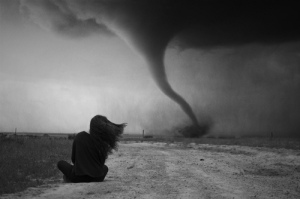


Recent Comments